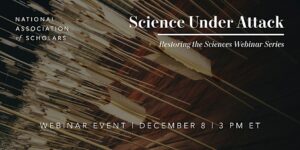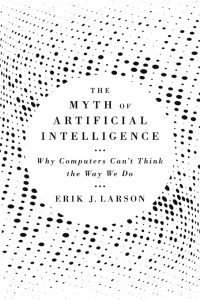On December 4, 2023, I received the following email from the NAS (National Association of Scholars):
Join the National Association of Scholars on Friday, December 8, at 3 pm ET for “Restoring the Sciences: Science Under Attack.”
Free inquiry, open debate, and skeptical questioning are the cornerstones of healthy science. But does that describe science today? Arguably, no—those cornerstones are currently being eroded at universities and scientific institutions around the county.
Can scientists pretend that science is immune to the ideologies that have conquered the humanities and are now sweeping through a broad range of disciplines in the science ecosystem? “No,” says Dr. Lawrence Krauss. Science is imperiled, and without scientists standing up for core principles, the vibrancy of scientific discovery and scholarship is in danger of following the liberal arts to a post-truth future.
This event will feature Lawrence Krauss, a cosmologist, theoretical physicist, author, and winner of numerous international awards for his scientific research and his writing. He is a passionate advocate of science, and for enlightening the public on the value of science to society, and the importance of defending science’s core principles. He is president of The Origins Project Foundation.
To learn more about the event, click here.
The NAS here is attempting to stand against the subversion of the academy, and science in particular, from the assaults on freedom of thought and expression by woke ideology. Increasingly, I’m seeing people like Krauss (and Pinker and Dawkins) assume the role as champions of traditional academic values (reason, merit, free discourse) against the barbarian hordes.
And yet, couldn’t it be said that precisely because of the materialist ideology that they have been promoting in the name of science all these years, they have helped bring about the state of affairs in the academy that they are now lamenting—in which woke ideology subverts all that they deem precious in the academy and science?
When I raised this question on an email list to which I belong, a list populated by ID proponents, I received extremely negative reactions to persons like Krauss, Pinker, and Dawkins. It wasn’t just their views and debating style, but their supposed grave personal faults. My question elicited a litany of sins credited to such materialist scientists.
But my interest here in questioning the NAS’s enlistment of Krauss to defend science was not over the sins (plural) of these scientific materialists in their personal or even professional lives but rather over the sin (singular) of scientific materialism itself, the view that science functions to advance materialism and that Darwin is this atheistic ideology’s principal prophet.
Is scientific materialism a sin, and if so, what is it a sin against? In fact, scientific materialism is a sin against reason in general and against science as reason’s most compelling expression. Scientific materialism is self-referentially incoherent. It’s a snake that eats its own tail and in the end consumes itself. This claim is not new and not just from people like me who oppose scientific materialism. Darwin made the point himself when he raised the following doubt in an 1881 letter to William Graham:
With me the horrid doubt always arises whether the convictions of man’s mind, which has been developed from the mind of the lower animals, are of any value or at all trustworthy. Would any one trust in the convictions of a monkey’s mind, if there are any convictions in such a mind?
C. S. Lewis and Alvin Plantinga have extended Darwin’s point. In his book Miracles, Lewis argued that on materialist principles, the mind is the operation of a physical system according to natural laws and thus will proceed with no necessary connection to knowledge or truth.
Plantinga took Lewis’s argument further with his evolutionary argument against naturalism. Plantinga noted that evolution, in its conventional materialist sense, by putting a premium on survival and reproduction, did not—and indeed could not—put a premium on knowing truth. And so any beliefs whatsoever that are compatible with survival and reproduction are, from an evolutionary vantage, as good as any other.
In fact, “goodness” has nothing to do with it. Our minds, as evolved brains adapted to changing environments, simply are what they are. It is irrelevant, for instance, to argue that humans spent the majority of our evolutionary history as hunter gatherers and thus we should respect what worked for our hunter-gatherer ancestors. The conditions of our existence have changed and we are, on evolutionary grounds, entitled to change with them.
It really makes no sense, on evolutionary grounds, therefore to remonstrate with woke ideologues for denigrating reason, dismissing merit, or censoring speech. Math, we are now told, is discriminatory because only the privileged are put in an educational setting where they can learn and excel at conventional math. And so, rather than try to raise the math skills of the un/under-privileged, we are enjoined to treat math as a free play in which all answers are as good as any others (thus we now see taken seriously that 2 plus 2 need not equal 4).
But again, just as the sins (plural) of the scientific materialists are not the focus of this brief essay, neither are the sins (plural) of the woke ideologues. Granted, I’m no fan of the deplatforming, the censorship, the celebration of mediocrity, the inversion of traditional morals, the flouting of conventional sensibilities in which woke ideologues revel.
My point is that woke ideology did not arise in a vacuum but is the logical outworking of a materialistic worldview in which humans are meat puppets evolved through a process that has no foresight or purpose and thus that gives life no greater meaning or destiny. And for people without the advantages (privileges) of a Krauss or Pinker or Dawkins, who do not find their identity in being valiant defenders of reason and science, challenging reason and science has a liberating appeal.
A world of reason is a world of constraints. It’s a world in which some things are so and not otherwise, and where if you don’t bend yourself to those constraints, you will be broken. There is something liberating about denying constraints. The old Army commercial slogan said “be all you can be.” Woke ideology says “be anything you can imagine yourself to be.” And what’s not to like about that?
A Darwinist might respond by saying, “sure, take that attitude, and we’ll be giving you a Darwin award for killing yourself in some incredibly stupid way.” But in fact, woke ideology seems to be prospering quite nicely in the academy and culture as a whole. This is why the National Association of Scholars is getting behind the newly formed University of Austin, which it describes as “a new university dedicated to the fearless pursuit of truth.” Steven Pinker has been a supporter of this new educational initiative.
The organizers of the University of Austin are bypassing the academy and culture as they’ve known it, seeking to restore what they regard as having been lost. The formation of the University of Austin sounds hopeful and inspiring to those who have been the butt of woke ideology until one remembers that it’s because woke ideology has so thoroughly infiltrated the mainstream academy that groups like the NAS are jumping ship from it and needing to found new schools where traditional educational values can reign.
Without meaning to sound facetious, their efforts remind me of the formation of Christian colleges and Bible schools in the early 1900s as it became clear that “liberal theology” had supplanted Christian orthodoxy in the mainstream academy, and that alternative venues were needed if students were going to be in an educational setting where traditional theological values reigned. Reality check: How did that work out? The secular culture steamrollered on, and the Christian schools remained largely marginalized.
I wish the University of Austin success, just as I wish the NAS success. In fact, I’m a lifetime member of the NAS. I first learned of it when a good friend of mine at Northwestern University was denied tenure in the early 1990s by an interim dean because my friend was a member of the NAS. I thought that any organization that could get my friend denied tenure at a school as woke as Northwestern (I’m using the term anachronistically) couldn’t be all bad. As it is, my friend ended up on the faculty at Stanford, a step up from Northwestern.
But just as with its promotion of Larry Krauss to defend science, the NAS has a history of undercutting its efforts to promote sound educational value by aligning itself with scientific materialists. Twenty years ago, it had Paul Gross (co-author with Barbara Forest on Creationism’s Trojan Horse) write a critique of intelligent design: “Intelligent Design and That Vast Right-Wing Conspiracy.” To its credit, the NAS did allow my colleagues and me to respond to Gross in an extensive “Letter’s to the Editor” follow-up.
The world of scientific materialism is a world with no design ultimately behind it. In such a world, things are not as they are because they were intended to be that way, and things don’t flourish because they are fulfilling their inherent end. In a world without design, it’s not quite fair to say that anything goes—physical laws will limit what can go. But in a world without design, there’s no reason to take seriously any constraints on what can go.
Thus, higher education will with a straight face now allow that two plus two equals five, that freedom of speech is an outdated relic, that reason is a tool of oppression, and that merit is a conceit of the privileged. To their credit, the NAS opposes this nonsense. But this nonsense is the legitimate offspring of scientific materialism, not some bastard child, not some subverting of an otherwise pure philosophy.
Woke ideology is not a betrayal of scientific materialism but its logical conclusion once people realize that on materialistic grounds we are here for no reason and have no destiny beyond this brief life, so that the only meaning our life can have is the meaning we give it, the meaning we construct for it. And if conventional educational values like freedom of thought and expression get in the way of that meaning that we are constructing for ourselves, so much the worse for those values.
Closing thought: The National Association of Scholars needs to cast its net wider to include more than scientific materialists among its defenders of science and reason.

